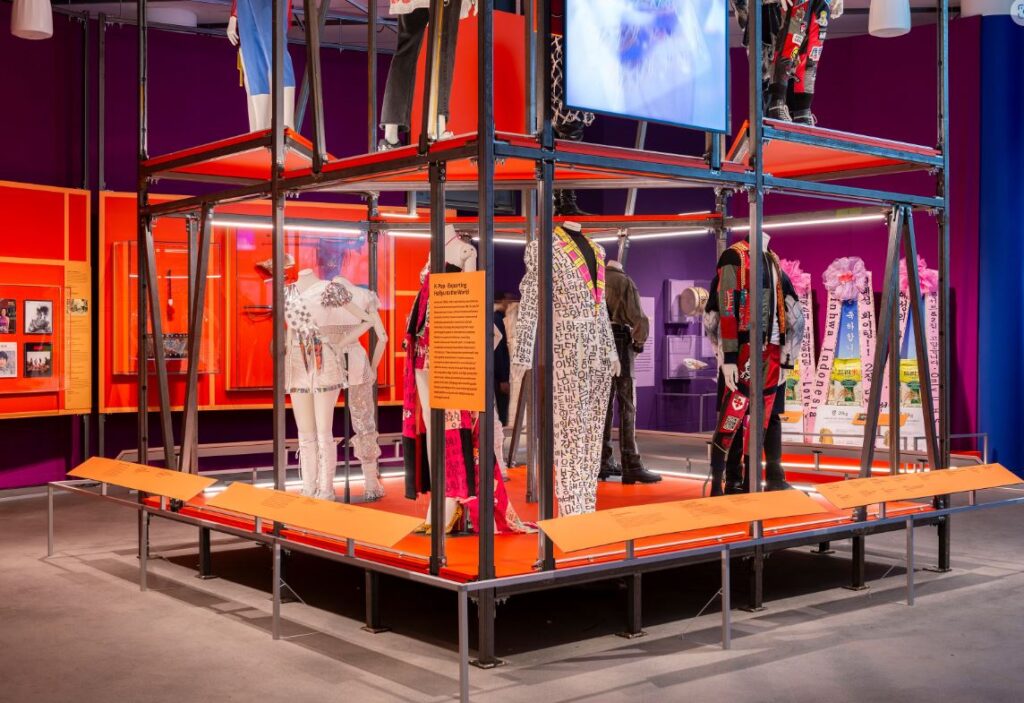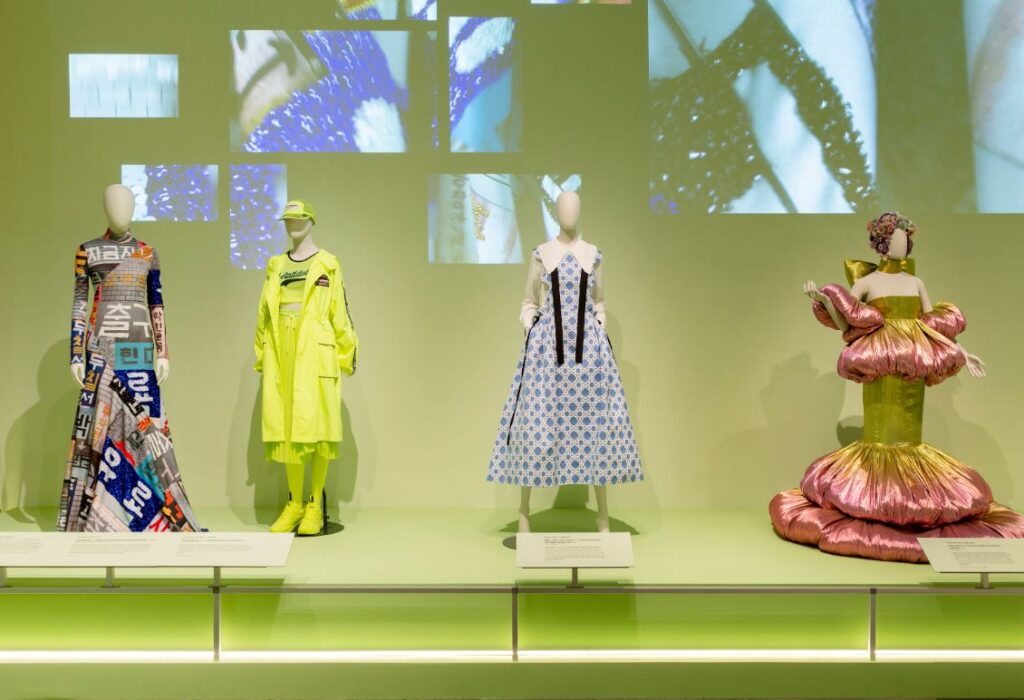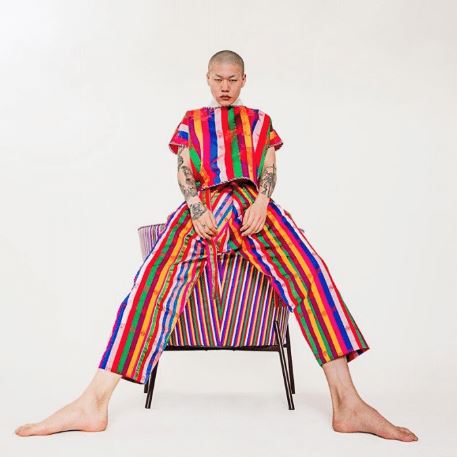By Rachel Lu, AsAmNews Intern
For fans of Korean Pop Music groups like BTS and Black Pink, Korean dramas like Squid Game, or award-winning movies like Parasite, the retrospective Hallyu! The Korean Wave at the Museum of Fine Arts Boston is bringing together objects from a wide variety of Korean culture from the past two decades.
“It’s absolutely a joy to see how people are responding to the exhibition. I’ve seen so many people, their eyes are, like, lit up, walking through the exhibition,” said Christina Yu Yu of the MFA Boston. The exhibit opened on March 24 and will be on view through July 28.
Originally created by the Victoria and Albert Museum, Hallyu! features around 250 objects that are organized thematically, including K-Pop, K-Drama, K-Beauty, and K-Fashion. Visitors can find costumes such as the iconic pink suit jacket worn by Psy in his 2012 viral hit Gangnam Style, explore the origins of the hanbook, Korea’s national costume, or experience a recreation of the bathroom set from Bong Joon-ho’s Parasite.
These cultural objects are part of Hallyu, or Korean wave, referencing the global phenomenon of Korean popular culture having an influence outside of Korea itself. However, beyond the fandom and star power, the exhibit also situates the country’s meteoric rise as a global sensation within the history of Korea in the 20th century.

“I’ve heard so many people say that, ‘Oh, actually, I didn’t know about that,’” Yu told AsAmNews. “So that’s precisely what we want to do. We want people to see that the phenomenon did not come out of nowhere. Korea has a long history and there’s a lot more to learn to understand about the country.”
To do so, Hallyu! puts the pop-culture objects in conversation with a dozen of the MFA’s Korean art collection, which is among the largest in the U.S. One of the objects on display is the white porcelain moon jar from the Joseon dynasty (1392–1910) that embodies the beauty of imperfection and the Confucian values celebrated as the guiding principles of society.
“A lot of them either directly or indirectly talk about how the traditional values or the traditional ways of doing things coexist with today’s fast pace in daily life,” said Yu. “Either they exist as in harmony, or they exist more like in a clash, and more at odds with each other.”
Unique to the MFA rendition of the exhibit is the inclusion of Korean American artists, including Boston based artist Timothy Hyunsoo Lee and Washington, D.C. based artist Julia Kwon. Lee’s artwork manipulates his family photographs from Korea using tin foil, reminiscent of childhood memories of his parents buying lottery tickets when they first arrived in the U.S. Kwon’s work uses traditional Korean cloth and references the rise of anti-Asian hate in the past few years.
The exhibit also includes a series of photographs from the MFA’s own staff member, Julia Kim, whose family immigrated to the U.S. through her grandparents who were officers in the Korean War and later became diplomats. Like many immigrant families, Kim’s grandparents moved to the U.S seeking a better life.
Yu hopes that the Asian American stories will provide a platform for others to be proud of their own immigration experiences.
“I think it’s something people can relate to. When I talked to Julia Kim, our staff member, one thing she said was that when she was growing up, she never felt she was American enough. Nor did she feel that she was Korean enough,” said Yu. “What was it? It’s kind of in between. I think that’s something that’s actually very, very common for second, third generation immigrants.”
Aside from the display of objects in the exhibit, the MFA is also offering a series of public programs related to Hallyu! such as College Nights designed for college students, a Korean film festival, and City Talks that are the MFA’s conversation series.

One of the public programs offered as part of City Talks is “Korean Standards and Stigmas” on May 30, which will be moderated by Hyeouk “Chris” Hahm, Professor and Associate Dean for Research at Boston University. Hahm told AsAmNews that she plans for the conversation to revolve around the reality behind the exponential development and transformation that propelled Hallyu to the global stage.
“So we have achieved this in an incredible miracle. And we have become a leader for this culture, this movie and fashion and everything. But at the same time, Korea had to suffer the consequences. That is mental health,” Hahm said.
According to Hahm, 38% of Koreans are estimated to be suffering from depression. Hahm partly attributes this to South Korea’s intensely competitive culture and unrealistic beauty standards. These societal issues should be discussed alongside the celebration of popular culture.
Similarly, the spotlight should also be given to the effects of anti-Asian hate in the U.S despite the historic successes of award-winning movies like Parasite and Minari. After Parasite won Best Picture at the Oscars in 2020, the rise in Covid related hate crimes against Asian Americans soon followed.
“So I feel so sad. What is the point of all these achievements in my mainland Korea? But in America, people don’t care,” said Hahm. “I was really feeling disappointed, disillusioned, sad and angry. After all, we are a minority group.”
Hahm hopes that the exhibit will generate conversations about the complexity of Korea and the challenges facing Korean Americans, while celebrating the cultural successes of Hallyu.
“We have such beautiful aspects about us. But also we have such painful and such shameful aspects of us,” Hahm told AsAmNews. “So I think understanding that component really gives us insights to try to think about the humanity aspects.”
AsAmNews is published by the non-profit, Asian American Media Inc.
We are supported through donations and such charitable organizations as the Robert Wood Johnson Foundation. This holiday season, please make a donation to Asian American Media Inc and AsAmNews and double your impact. Thanks to an additional benefactors, all donations are now being matched up to a total of $16,000.
Follow us on Instagram, TikTok, Facebook, YouTube and X.


